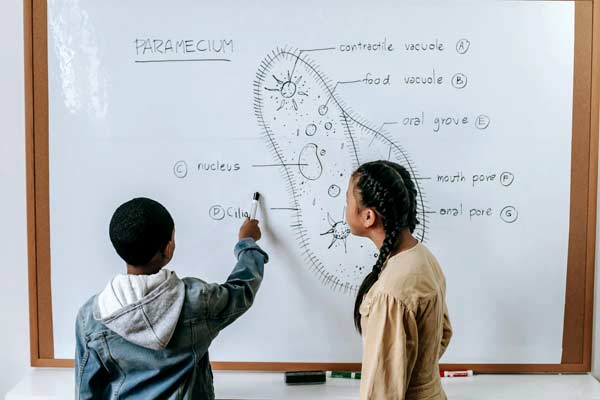How Many GCSEs Do You Need? A Clear Answer
When it comes to GCSEs, many students often wonder how many they need to take. The minimum number of GCSE subjects students must take, including English and Maths, is five. However, depending on their plans, most students take between nine and ten GCSEs.
Taking more GCSEs can benefit those who plan to continue their education at a sixth form or college. This is because many A-level courses require students to have a certain number of GCSEs in specific subjects.
It’s important to note that entry requirements vary between schools and colleges, so it’s always best to check directly with the institution.
On the other hand, students who plan to enter the workforce directly after finishing their GCSEs may not need as many qualifications.
However, having good GCSE results can still be beneficial when applying for jobs or apprenticeships. Ultimately, the number of GCSEs students choose will depend on their goals and aspirations.
Understanding GCSEs
GCSEs are exams taken by 14 to 16-year-olds in England, Wales, and Northern Ireland. Students usually take them in Year 10 and Year 11. They’re part of the National Curriculum that lists all subjects.
While students can decide on how many GCSEs to take, they often choose between nine and ten subjects. However, they need to take at least five. The number chosen depends on if they plan to study further or work after their GCSEs.
Previously, GCSEs had grades from A* to G. But since 2017, they use a 9 to 1 scale, with nine as the top grade. This change helps show clearer differences between student performances.
Ofqual oversees GCSE grading. It sets the minimum marks for each grade in every subject and exam board. The main exam boards for GCSEs are Pearson, OCR, and AQA.
Every student must study core subjects like English, math, and science. They can also pick subjects like history, geography, languages, and art.
Subject Choices in GCSEs
When choosing GCSE subjects, students in England and Wales must take three core subjects: Maths, English, and Science. In addition, students are free to choose from various subjects depending on their interests and career aspirations.
🌟 Hey Students! 🚀 Ready for the ultimate experience? Join us on Studentsinside.com's Facebook, YouTube, WhatsApp, and LinkedIn. Click now for tips, fun, and success vibes! 🌈✨ #StudentLife #JoinUs
The number of GCSE subjects a student takes can vary, with most students choosing between nine and ten subjects.
However, some academically advanced and ambitious students may take eleven or twelve GCSEs at a time. While there is no upper limit on the number of GCSEs a student can take, the maximum number of GCSEs that can be taken at once is around 16.
In terms of subject options, students can choose from a variety of subjects, including English Language, English Literature, French, Spanish, History, Geography, Music, Design and Technology, Modern Foreign Languages (such as German, Mandarin, and Welsh), Drama, Media Studies, Food Technology, Religious Studies, Art and Design, Technical Subjects, Computer Science, Biology, Chemistry, and Physics.
Pick subjects that match your interests and future job goals. For instance, if you want a medical career, consider taking Science classes like Biology, Chemistry, and Physics.
Alternatively, if a student is interested in pursuing a career in the arts, they may consider taking subjects such as Drama, Music, or Art and Design.
Ultimately, deciding which GCSE subjects should be based on a student’s interests, strengths, and future goals. Students must research their options and speak with their teachers and parents to make an informed decision.
GCSEs and Further Education
GCSEs are an essential qualification that students must obtain before moving on to further education or work.
The number of GCSEs and grades required for specific courses will vary depending on what and where students choose to study. However, most sixth-form colleges require four or five passes (grade 4 or higher) at GCSE, emphasizing maths, English language, and science.
GCSEs are essential for those planning to continue their education at a sixth-form or college. Most students choose to take between nine and ten GCSEs, but the number of GCSEs you should take depends on what you want to do after you leave school.
Many Further Education and Higher Education courses require GCSEs in subjects like English, maths, and sometimes science. Think of them as crucial entry points to higher learning. They give you a fundamental understanding of different subjects.
GCSEs are also crucial for students who plan to apply to university. While universities do not usually require specific GCSE grades, they look at GCSE results as part of the application process. Universities typically need students to have at least five GCSEs at grade C or above, including maths and English language.
Students needing to obtain the required number of GCSEs may still have options. Some colleges and universities offer foundation courses to help students gain the necessary qualifications. Additionally, some apprenticeships and vocational courses do not require GCSEs.
GCSEs and Career Paths
Picking the right GCSEs is essential for your future job choices. While you don’t need specific GCSEs for all jobs, some subjects help with certain careers. For example, if you want a medical or vet job, you should be good at subjects like Biology, Chemistry, and Physics. Maths and Physics are essential if you’re considering engineering or tech jobs. Subjects like English, History, and Social Sciences are helpful for careers in law or teaching.
Employers often look for candidates with a well-rounded education and skills, including communication, problem-solving, and critical thinking. Therefore, students must choose a combination of subjects to help them develop these skills.
Some careers may require specific qualifications beyond GCSEs. For example, students interested in pursuing a career in medicine must have a degree in medicine and complete postgraduate training. Likewise, students who want to become lawyers must earn a law degree and clear the bar exam.
GCSEs Across the UK
In the United Kingdom, GCSEs are taken by students in England, Wales, and Northern Ireland. The Scottish equivalent is the National Five qualification.
In England, students typically take around 5 million GCSEs annually, with 250,000 AS and 750,000 A levels also being accepted.
The Education Department has made a list of critical subjects called the English Baccalaureate. This list has English, math, science (like physics, chemistry, biology, and computer science), history, geography, and old or new foreign languages. In England, GCSE grades go from 9 to 1, with nine being the best. A grade of 4 is seen as a regular pass, and a grade of 5 is seen as a good pass.
In Wales, the Welsh Baccalaureate is a compulsory part of the curriculum, and students take a range of GCSEs and vocational qualifications. Wales’s grading system is similar to England’s, with grades ranging from 9 to 1.
In Northern Ireland, students take GCSEs in various subjects, including English, mathematics, and science. The grading system differs from England and Wales, with grades ranging from A* to G.
GCSEs are an essential qualification for students who wish to continue their studies at university or college. Many universities require students to have a certain number of GCSEs at a specific grade level to be considered for admission.
For example, the University of Oxford requires students to have at least five GCSEs at grade 6 or above, including English and mathematics. The University of Cambridge requires students to have at least five GCSEs at grade 7 or above, including English and mathematics.
In summary, GCSEs are an essential qualification for students across the UK, with different grading systems and requirements depending on the country and institution.
Assessment and Grading in GCSEs
GCSEs are a series of exams taken by students in the UK at the end of their secondary education. These exams assess a student’s academic ability and knowledge in various subjects.
The grading system for GCSEs has changed in recent years, with the traditional A*-G letter grades being replaced by a numerical system from 9-1.
Assessment in GCSEs is typically done through a combination of exams and coursework. Exams are usually taken at the end of the two-year GCSE course, while coursework is completed throughout the course. The exact balance between exams and coursework can vary depending on the subject and the school.
Grading in GCSEs is based on a student’s performance in exams and coursework. To pass a GCSE, a student must achieve a grade of 4 or above, equivalent to a C or above in the old grading system. A student’s highest grade is 9, equivalent to an A** in the old system.
Students must revise extensively for their GCSE exams, as the workload can be heavy. This can include attending revision classes, using revision guides, and practicing past papers. Students who fail to pass their GCSEs may be required to retake the exams in year 11 or later.
Alternative Qualifications
While GCSEs are the most common qualifications taken by UK students, alternative options are available. These alternative qualifications can be helpful for students who may not perform well in traditional exams or want to pursue a more vocational route.
BTECs
BTECs are hands-on courses that teach students practical skills in specific subjects. They come in levels 1 to 3, with level 3 similar to A-levels. You can take BTECs in business, engineering, health care, and sports.
Diplomas
Diplomas are vocational qualifications that are equivalent to GCSEs and A-levels. Diplomas are available at levels 1 to 3, with level 3 being equivalent to A-levels. Diplomas can be taken in various subjects, including business, engineering, health and social care, and sport.
Apprenticeships
Apprenticeships let students earn money as they learn a job skill. They range from level 2 (like GCSEs) to level 7. You can find them in construction, engineering, health care, and IT.
Level 2 and Level 3 Qualifications
Level 2 and level 3 qualifications are vocational qualifications that are equivalent to GCSEs and A-levels, respectively.
These qualifications are designed to give students practical skills and knowledge in a particular subject area. Level 2 and 3 qualifications can be taken in various subjects, including business, engineering, health and social care, and sport.








